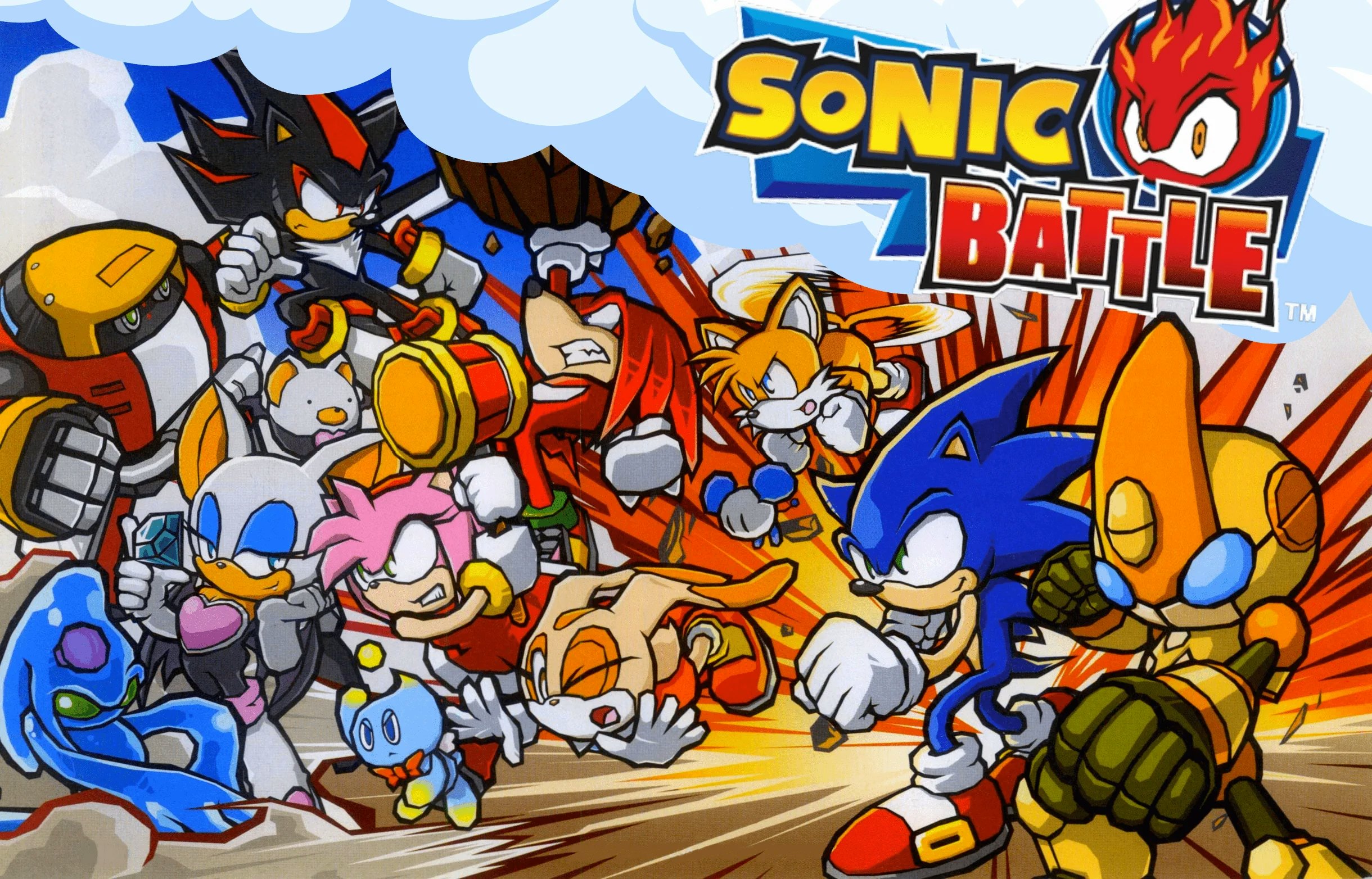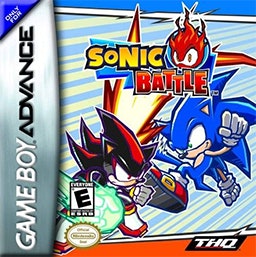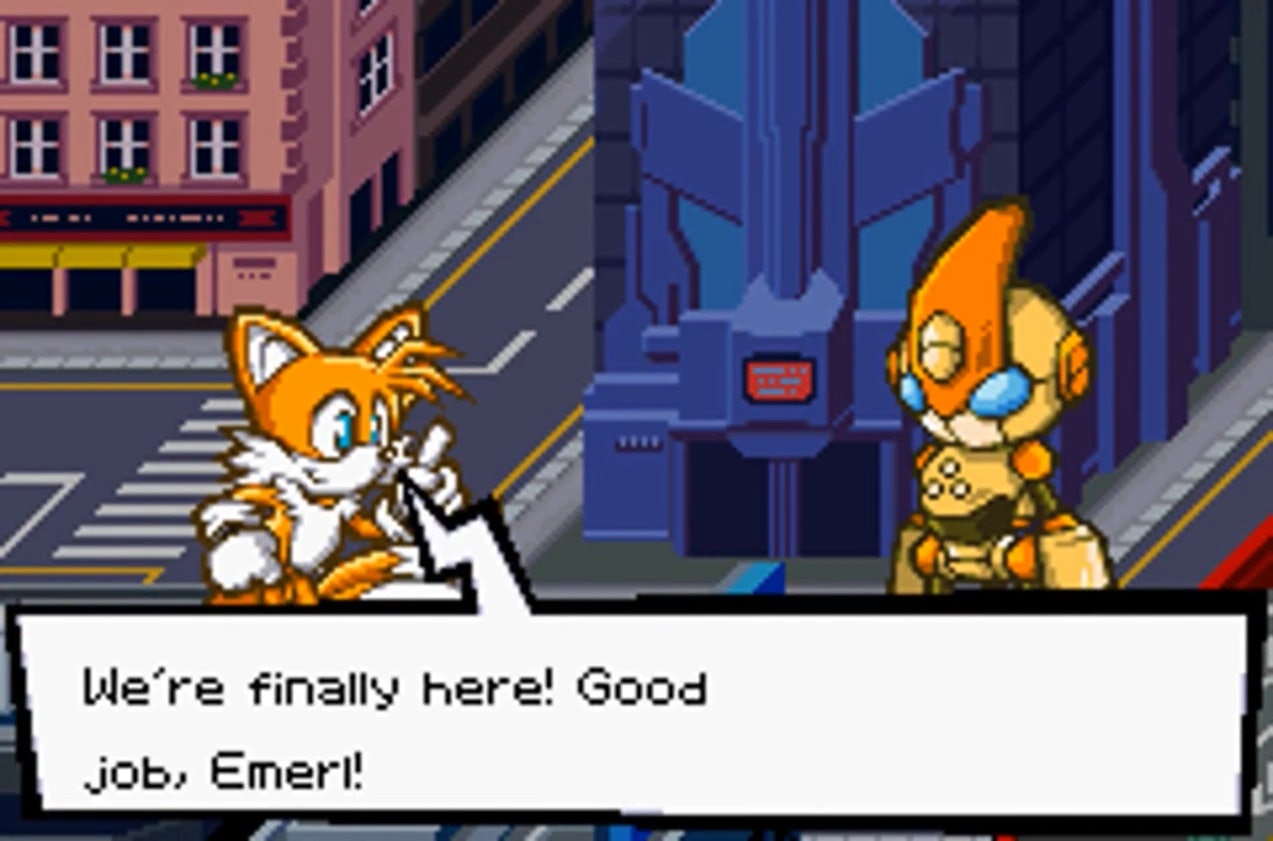
It only takes a second. From the very first moment you boot up Sonic Battle, you’re hit with a sense of frenzy. Some simple DUN, DUN, DUN beats alongside a flurry of images before you’re greeted by the game’s logo. Not some clever double-entendre like Sonic Adventure 2, or a cutesy moment between two pals like with Sonic the Hedgehog 2, but a floating, wide-eyed face engulfed in flames.
This rather flamboyant opening lets you immediately know this isn’t your typical Sonic escapade. Cute little Chao Gardens are out, while throwing hands with a litany of characters from the Blue Blur’s gaming history is certifiably in. But as it turns out, behind this aggressive exterior lurks one of the series’ most engaging stories oozing with heart and a genuine respect for the franchise.
First released in North America back in January 2004, Sonic Battle was developed by Sonic Team and published by THQ for the Game Boy Advance. It was the second fighting game seen for the franchise, with the first being 1996’s similarly straightforward-titled Sonic the Fighters. The latter was a 3D, arcade-style arena fighter along the lines of other popular titles like Tekken or Virtua Fighter, while Sonic Battle seems to only have the genre of “fighting” in common.

Given the hardware, there’s hardly any surprise the game isn’t sprawling with 3D-rendered environments or blockbuster animation. It does, however, make up for that with its nifty sprite animations. In a lot of ways, the art direction is an improvement over Sonic the Fighters and sets the overall experience apart from many other fighting games on the platform.
Instead of forcing you to learn complicated button combinations, Sonic Battle opted for a simpler approach. You have your main attack button, a trio of special attacks that you can decide on before each fight, a block, and a healing move. The strength, speed, and ease of all the moves varies with each character — especially animation-wise — so experimentation is encouraged.
After completing a basic combo, you’ll send your opponent flying across the screen — maybe even, deliciously enough, into a wall — and have the opportunity to rocket into the air and slam them back into the ground for massive damage. It’s almost like something you’d see out of Dragonball Z.
High praise? Sure. But the heart is there.
But the gameplay itself isn’t what makes Sonic Battle so memorable. Nay, it’s the game’s story that makes it a fascinating relic to behold. And it all revolves around a new character: a 4000-year-old sentient robot-weapon called the Gizoid. As all old artifacts from ancient civilizations tend to go, Dr. Eggman unearths the robot but, out of frustration for not getting it to work properly, tosses it on a beach where our old buddy Sonic discovers him.
Turns out, the big thing this Gizoid can do is copy. Sonic is his first template, and the robot forms a bond and genuine friendship with the Hedgehog, who ends up naming him “Emerl” after discovering he can use the Chaos Emeralds. You then go on an episodic quest to find the rest of the emeralds, train your fighting skills, and form bonds with the rest of the Sonic cast of characters.
Emerl’s copy ability is key for a couple of reasons and serves as the core of what makes the game work. From a gameplay perspective, Emerl can eventually learn every character’s different moveset, including their fighting stances and running animations. You could have one of Sonic’s special moves with, let’s say, the flight powers of someone like Rouge the Bat, and the basic combo attacks of that blue liquid menace Chaos from Sonic Adventure fame. It’s a cool way of the classic create-a-character style of gameplay that fits the story so well.

Emerl’s copy ability is also integral to the story. There’s lots of dialogue in Sonic Battle’s story mode, and Emerl’s reactions are part of the charm. He starts with the maturity of a child, only able to parrot a few words repeatedly like some futuristic Pokemon, and eventually transforms into a genuine character who wants to help protect his newfound friends.
If you’re a big Sonic fan, there’s also something incredibly engaging about seeing how Emerl interacts with each character. Having formed an initial kinship with Sonic, his views can certainly alter after meeting the more “villainous” characters like Rouge and Shadow the Hedgehog, the latter of which is especially enjoyable thanks to his gruff exterior. There are some real, genuine moments of character development here, and it plays similarly to something you might’ve seen in similar robot-learning-humanity stories like Cyberpunk 2077 or the Deus Ex series.
High praise? Sure. But the heart is there. Sonic Battle isn’t on the Blade Runner level of philosophical introspection, but it’s the Sonic version of it. It’s a joyful experience, especially if you grew up a fan of these characters.
Sonic Battle hits you not with its combat, but with its heart.
But most memorable of all is the ending, in which Emerl is lured into a trap by Dr. Eggman and his programming goes nuts, turning the adorable android into the conquering, annihilation-infused robot that he was originally designed to be. Sonic manages to stop him, but Emerl himself is lost. In his final moments, he delivers a goodbye to each character and laments that he won’t be able to share any more joy with them. It’s a brutal ending. Tear-jerking, even, similar to that of The Iron Giant — another friendly robot who goes against his original programming.
Sonic has had plenty of forays into other genres over the years, similar to his mustachioed rival Mario, but not with nearly the same success (the less said about Sonic Shuffle the better). Sonic Battle is the rare exception. It may not have had the most memorable combat for a fighting game, mostly relying on cool animations rather than in-depth mechanics, but it had something perhaps even more important: an engrossing story.
Emerl’s journey is one with many different lessons learned from each character. He grows as much as they grow meeting him, and in doing so delivers some of the best storytelling moments of the entire franchise. From Shadow relinquishing his Chaos Emerald to Emerl to signify him finally moving on from his dark past to Tails’ hope for a world without violence, Sonic Battle hits you not with its combat, but with its heart — and way more than it had any right to.







